Woodstock was undoubtedly, the greatest musical phenomena of the twentieth century. Nineteen-sixty- nine was a summer of belief. A summer of magic. It sprouted like mushrooms, a culture of love and peace to bathe the battle-weary heads in life’s sweet celebration.
We know the story. We were half-a-million strong when we arrived at Woodstock. But for the generations who have grown up and lost the trail of the flower children, it can be
difficult to understand what caused Woodstock, because the flower children were the key.
The flower children were a curious counter-culture revolution. They had grown up in homes where the women had covered American industry while their men went to war, with many still choosing a career as well as the role of housekeeper. Their mothers wore slacks, engaged in sports and took an active part in the Woman’s Movement. The flower children celebrated their femininity.
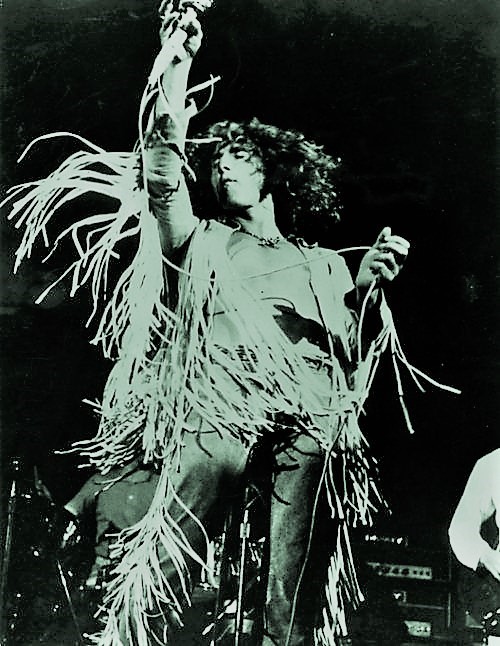
#1 A New Vibration
Woodstock was undoubtedly, the greatest musical phenomena of the twentieth century. Nineteen-sixty-nine was a summer of belief. A summer of magic. It sprouted like mushrooms, a culture of love and peace to bathe the battle-weary heads in life’s sweet celebration.
We know the story. We were half-a-million strong when we arrived at Woodstock. But for the generations who have grown up and lost the trail of the flower children, it can be difficult to understand what caused Woodstock, because the flower children were the key.
The flower children were a curious counter-culture revolution. They had grown up in homes where the women had covered the American work industry while their men went to war, with many still choosing a career as well as the role of housekeeper once the men returned. Their mothers wore slacks, engaged in sports and took an active part in the Woman’s Movement. The flower children celebrated their femininity.
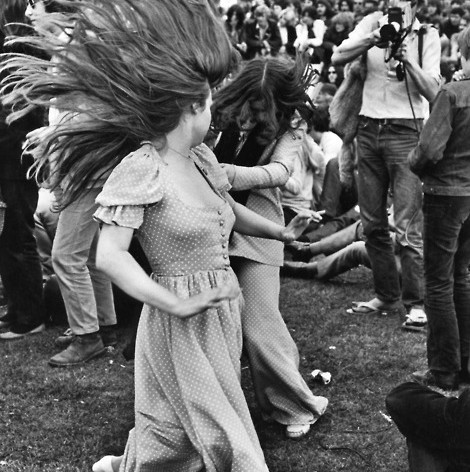
#2 How We Danced… How we skipped and turned
The flower children seeded the hippie revolution. The same thirteen-year-old girls who had screamed and cried when the Beatles first appeared with a handful of danceable, enjoyable love songs, exchanged their mini-skirts for ankle-length dresses a couple years later, and their vinyl matching caps and boots for beads and bangles.
The young men who accompanied them were beautiful. They grew their hair long and donned frilled, fluffy shirts. They talked gently and walked softly. They were enthralling.

#3 They Wore Flowers in Their Hair
They believed peace had a chance. Where they drifted, they left a sparkle, a splash of color. People changed. They dressed more casually, were friendlier toward each other. Some copied the flower children without really understanding them. Some understood and followed.
The music changed. As the Beatles evolved, so did rock and roll, with the sounds reaching higher and higher until they seemed to soar on wings and still the flower children danced.
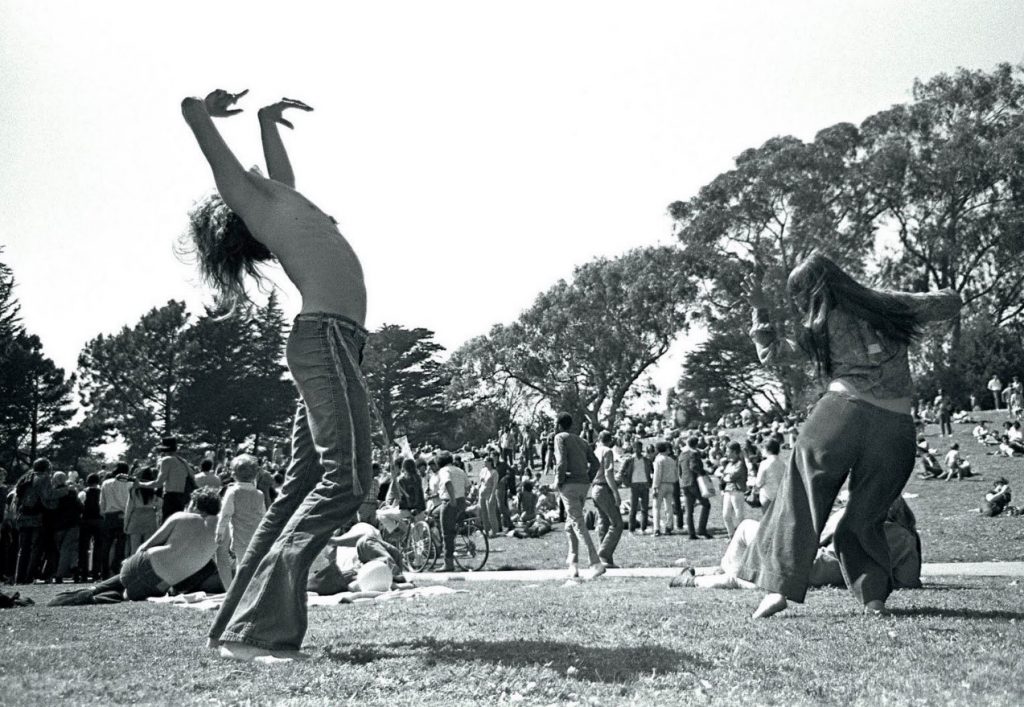
#4 We Felt We Could Touch the Sky
The music was inside. The musicians put a voice to it. We understood. It was an exchange. We gave our energy. They took it to seek higher. We responded with joy, with tears of emotion. Tangled and deep, bright and cheerful, long chords rolling over each other, the primal rhythm of the forests all rolled into our minds and pulled out by the gifted artists.
We heard the simple fare of poets and the electric symphony of Jimmy Hendricks. The peace keepers, the visionaries, the angels of love. We embraced them all, Melanie with roller skates, the blazing tones of Earth, Wind and Fire.
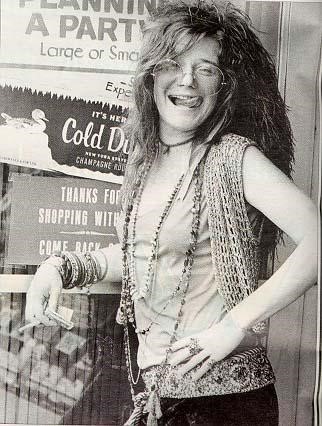
#5 Janis Joplin was Our Queen
The pre-feminist, rock and roll woman was establishing a new identity. She had become uncomfortable with materialism and socially acceptable appearances. Many had experimented with several different types of relationships, including bi-sexual experiences, group marriages and co-habitation. They had learned to love freely, easily, without reservation, but had not learned to turn off the valve when things went sour. They had not learned how to stop aching.
We followed Joplin’s throaty wails into the night because our hearts knew her despair. We knew the trip into darkness. We knew about those who had touched too deeply to ever forget them, wishing desperately that we could or at least bring the good times back once more to savor.
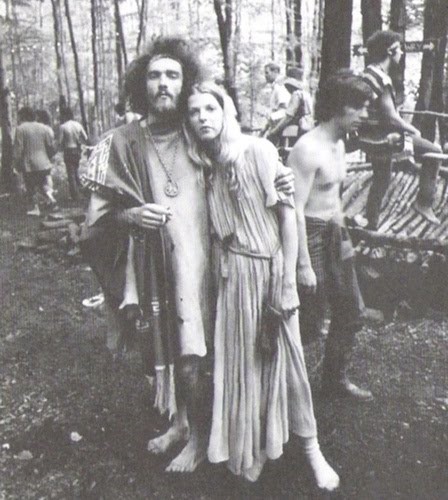
#6 Pre-Feminist Women Felt Deep Attachments and Loyalties to their Men
The sexual revolution may have struck a crippling blow at traditional marriage, but the pre-feminists were still exploring partnership roles in a traditional manner. In their efforts to create a more natural living environment, some reverted to models of early pioneer women who worked beside their men, but still washed all the clothes, fixed the meals and tidied up around the house.
Some joined motorcycle clubs or gangs to be with their men. Some lived on communes or in shared housing. Some were only weekend rockers who punched clocks during the day and came home at night to black light posters and beer. Whatever their chosen life-style, when they walked beside their men, they were showing their unity with them.

#7 Pre-Feminist Women were Family Oriented
By the time they were in their late teens to early twenties, many of the pre-feminist women had started having babies. Within the hippie culture, very few chose the option of leaving their children with a babysitter, so they could enjoy a night out. They took their children everywhere with them; on road trips, all night camp-outs, political protests and concerts, to the flea market to sell incense. It was an adventure. It was discovery, and they wanted to share the experience with their children.

#8 Our Goal was to Love Completely
Although defined as the Sexual Revolution, for the pre-feminists of the late nineteen-sixties, it wasn’t as much about liberating their bodies as it was about liberating their love. It was about examining how much they could love each other with all their bumps, warts and bad habits.
Pre-feminist women formed close relationships with each other. They shared in their dreams, their broken promises, their daily experiences, their hopes for the future. They were supportive of each other’s abilities. They raised their children together under common value systems. For some it was drugs, sex and rock ‘n’ roll. For others, it was all about the music.
#9 All We Could Imagine
In some ways, it was the best of times to be a woman, especially if you were a woman artist. All the boundaries had been removed on what a woman couldn’t do, and it was up to us to discover just how much we could do in a traditionally men’s world.
Hard rock artists, traditionally dominated by men, were moving over to make room for Grace Slick and the Jefferson Airplane. Tina Turner towered over Soul. Yoko Ono was coming into her own, despite early opposition to her partnership with John Lennon. Within the sphere of body painting, tattooing, van art and murals, women artists were a joyous inclusion, although their experiences didn’t prepare them for a commercial setting. Since commercial success wasn’t on their minds, it didn’t matter.
#10 What Mattered was Our Connection with Each Other
The more we reached out, the greater we grew. We were billowing robes in paisley. We were the bare feet of spring. We were spiritual advisors. We were mother, daughter and sister, all rolled into one. We were valued. We shone in all our womanly glory. And there was nothing more glorious than the unity we shared. The unity led us to Woodstock.
It could be argued that Woodstock was such a huge success because of the number of big rock and roll names lined up to pull in the fans. It could be said it was due to strategic marketing. The truth is, it wasn’t really like that. The most optimistic analysts predicted only one fourth the actual turn-out.
Woodstock had already formed in the collective mind of rock and roll followers long before it was introduced on paper. The transient youth population, traveling from coast to coast by bus, car, van or hitch-hiking carried the news of the concert faster than any electronic wire.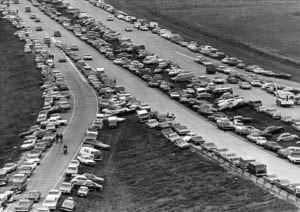
#11 Woodstock was a Destination
…A homing beacon for those who had lost the trail of the flower children. A vision remained of the first time they came. How they moved through the streets. How the sun always found them. How they touched you. How they smiled. They slipped through the towns like gently blowing dandelions and disappeared.
Weeks before the concert was aired, the East Coast throbbed with expectancy. Nearly every park and other public places suitable enough for strumming a guitar or practicing a flute was alive with music. Minor bands followed major bands, striking up spontaneous live concerts in the hopes of favorable notice.
In the final weeks, migrations of hippies had poured into the Catskill Mountains from every corner of the United States. The phenomena had begun.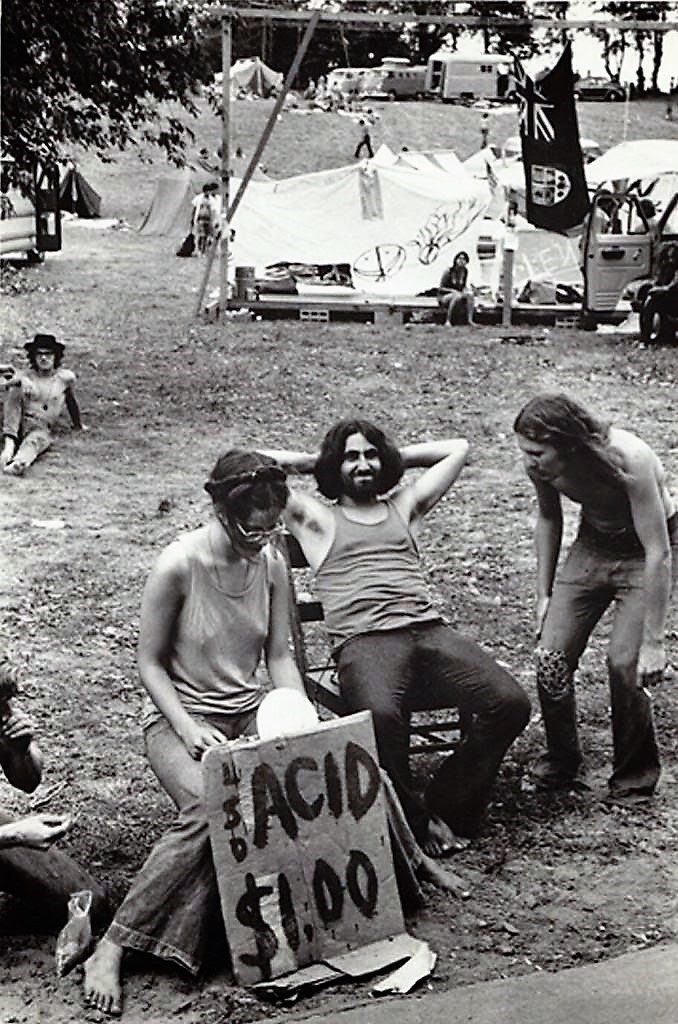
#12 Maybe it was the Acid
It was everywhere. It seeped through the fingers. It touched everyone directly or indirectly. It opened another dimension. It was like neverland. You couldn’t find it on any chart but once you got there, the world around you was magic.
Time didn’t matter. Nature exploded around us in living color. We had been making our own music for days, singing our own songs, dancing to a beat that sprang out of Earth, itself. We were golden.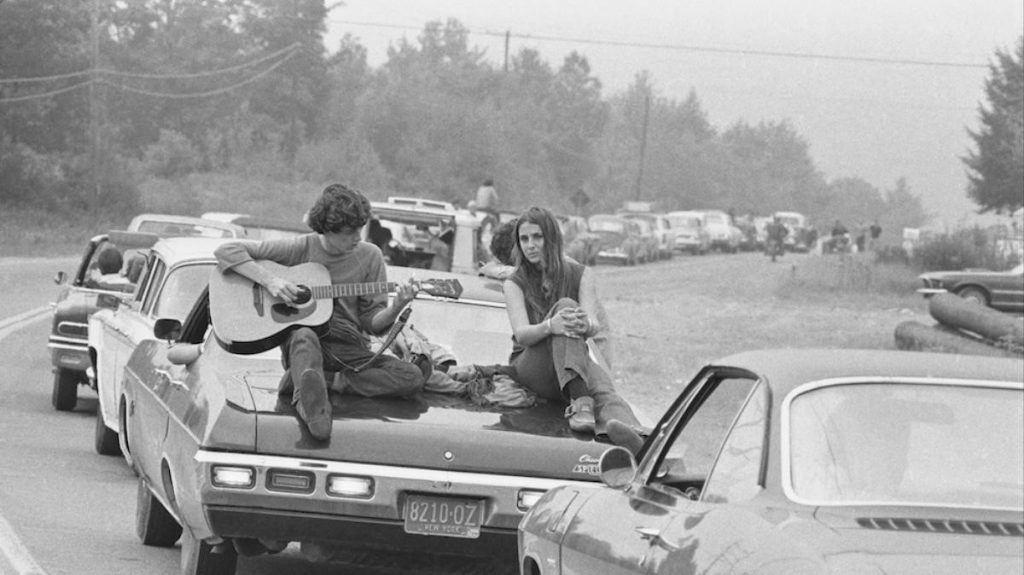
#13 The World Came to Us
We were the dancers. We were the dreamers. We were looking for Paradise and found it in the Catskill Mountains. We had never been so alive. The world looked on and wondered.
It observed, but it didn’t understand. It saw the impossible traffic jams. It saw the crowds overflowing a small farm town. It didn’t see that the gatherers weren’t waiting. They were living the adventure. They were discovering everything wonderful about where they were and who they were traveling with.

#14 The Entire Countryside was a Playground
For some, it was the first time out of the city. The world surrounding them was fresh and new, wild and free. The fever of the urban beat mellowed, the frantic pace slowed. The song was the fluting whistle of bulrushes and the tinkle of flowing water.
It was a transitional moment; a connection between the urban and the rural. They saw each other, saw the lives each had led, reflected in each other’s eyes. In the magical world they had created through music and dance, they shared their knowledge, their truths, their doubts and questions.
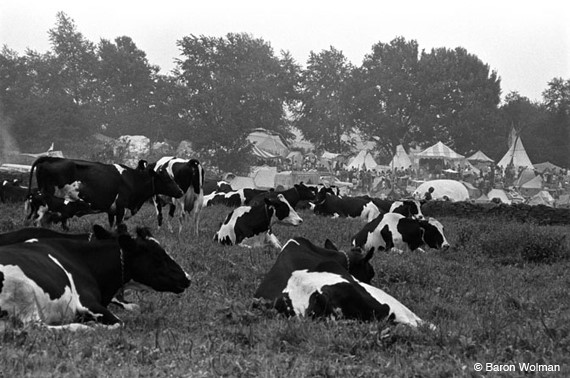
#15 It was Fantasia
It was an exaltation of life. It poured through us, the thick wine of the gods, so joyously, even the animals talked. We played in the sun. We played in the long, unguarded moments with all things living and breathing, acknowledging them as equals.
We were returning to the garden. We could see it so clearly. Hear its orchestra in the clouds. We breathed with expectation, transfixed with each performance, reaching to new heights.
Like Fantasia, the rains came. The clouds rolled in, long and dark, and we gathered in cold and misery. But when the sun returned, the flutes played, and the children rejoiced once again.
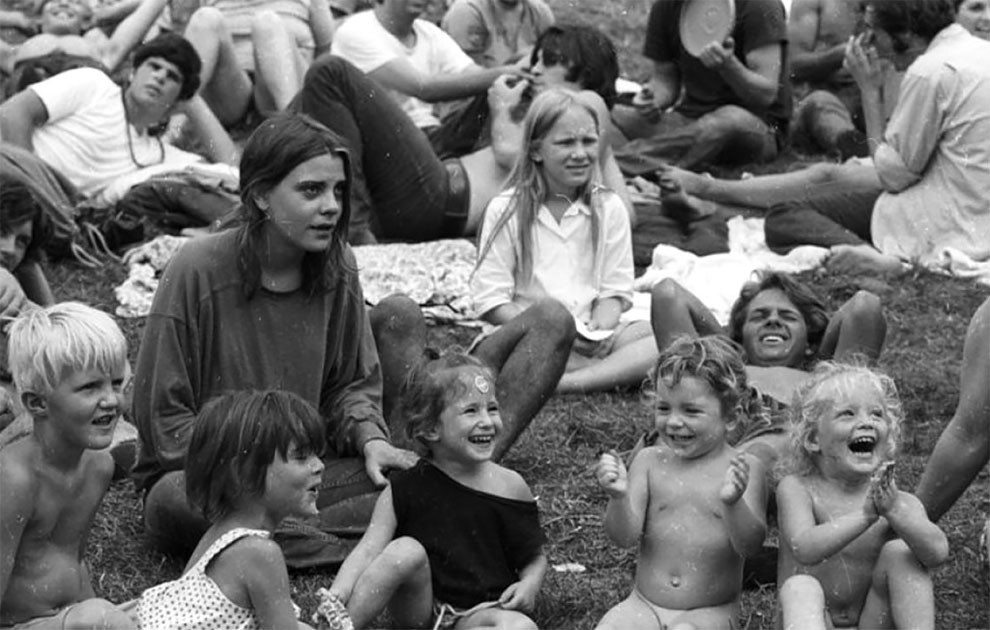
#16 We Questioned Authority
Pre-feminist women had rejected conventional twentieth-century rules for behavior, relationships and raising children. They were left with making a few rules of their own. Their heightened sensitivity made them redefine their belief systems and their moral compass. Although most pre-feminist women harmoniously agreed on the abortion issue, declaring it was a woman’s right to choose, they began to debate the circumstances under which an abortion would, individually, be acceptable. Subtly, with no real fan-fare, the split between anti-abortionists and pro-lifers had begun.
Many pre-feminists had already rejected artificial preservatives and flavors in their foods, synthetics and chemical additives, but their new awareness carried them a step further.
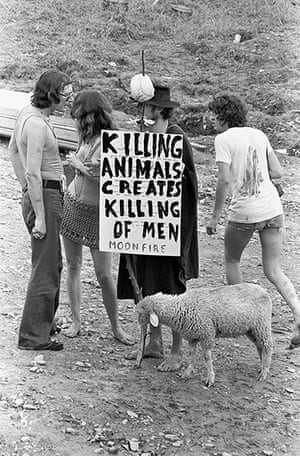
#17 It was no Longer what You Ate, but Who You Ate
The average pre-feminist was a hearty meat eater. She usually lived in an environment where she bought meat from a butcher or straight out of a supermarket. Very few lived on farms where they raised their meat or in an area where they hunted wild game.
It was difficult to develop an appetite for meat when all around you are the victims of your appetite. When they, too, are celebrating life. Many animal rights groups gained support during Woodstock, such as Greenpeace and the S.P.C.A., and many Woodstock participants became vegetarian.
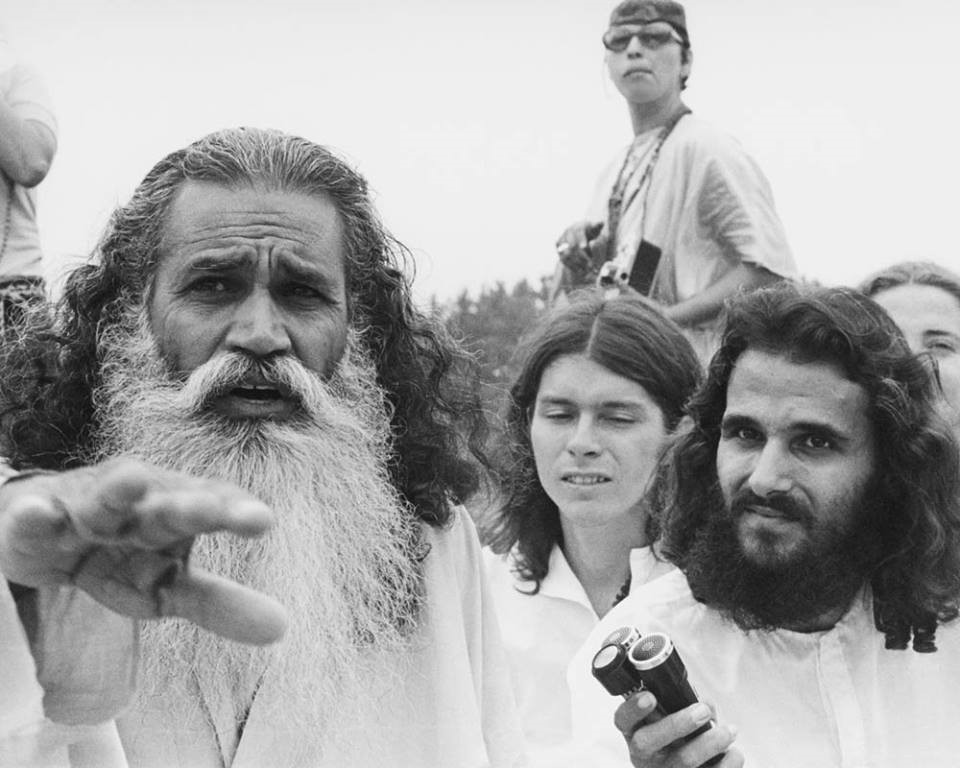
#18 An Overwhelming Sense of Spirituality Pervaded the Woodstock Experience
The nineteen sixties were an explosion in color and a journey into the unknown avenues of the mind. It was a time of mystics, of spiritual leaders, of psychics and star gazers. Eastern and Western religion ran together in rivers. We meditated. We prayed. We breathed in and out with the rhythm of the earth. We healed with our hands. We healed with our voices. We believed.
It was enough to believe. We were the counter-culture. We pushed back against the wheel. We planted flowers where none had grown before. We were bringing back the whales. We were stretching out our arms across the ocean.

#19 We Were Warriors Once
Soft and vulnerable, gentle and kind, the flower children seemed as substantial as fairies, there only for a second from the corner of your eye, before drifting off to create more magic. You couldn’t catch them. You couldn’t hold them, but beside them stood the strong, warrior woman.
The pre-feminist, warrior woman knew exactly who she was, a pillar in the storm, a line drawn in the sand. She was solitary. She made her own choices in life and lived by their consequences without shame. The flower children provided the spirit and the warrior woman the backbone for the pre-feminist woman’s movement.
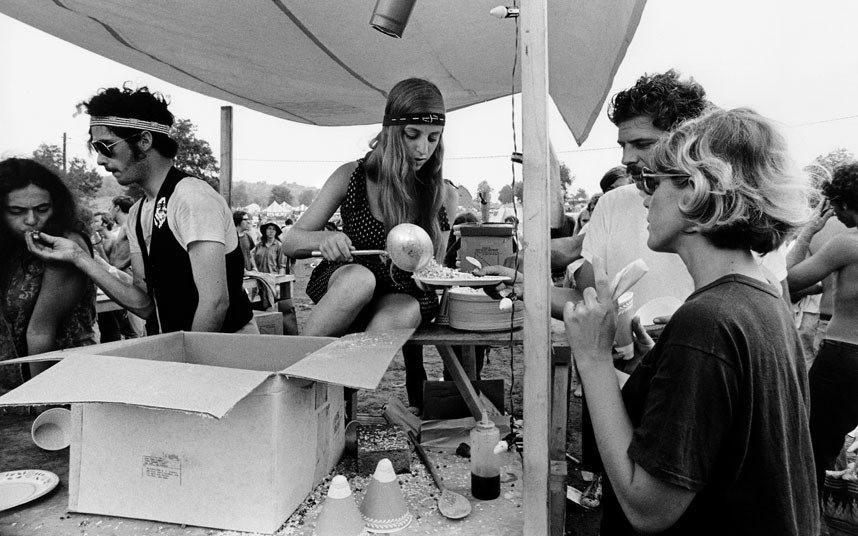
#20 We Formed Communities
We worked well in teams. We didn’t really have a chain of command. We didn’t have anyone assigning tasks. We didn’t have a pecking order. When you woke in the morning, you simply looked around to see what needed to be done. The first person up, usually made the coffee. Other morning tasks included securing fresh water for drinking, cooking and cleaning, attending the camp stove, freshening up the campsite, and placing sleeping bags and clothing out to air.
Meals and childcare were also a communal effort, shared equally by both the men and the women. Foods that had been brought along on the trip, purchased in the town, or foraged one way or another, were shared. We volunteered at the food kitchen. We paid attention to each other’s needs. In return, our own needs were cared for.
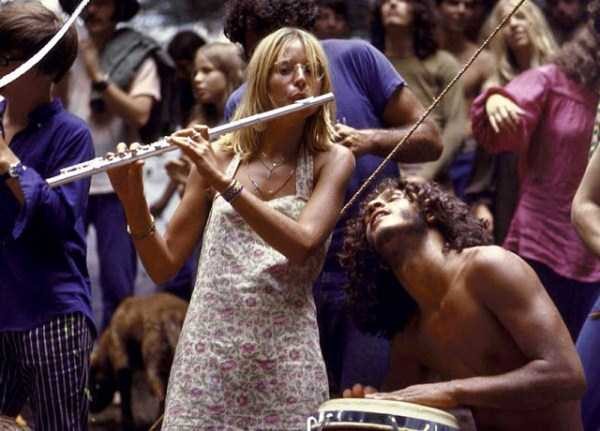
#21 Woodstock Would Have Happened
If not in the Catskill Mountains, then in another place where the people and the land embraced us. We were primed and ready for it. For the observers drawn to the big bands, it was somewhat disappointing. It was over-crowded and under-maintained. Food supplies ran low. Rumors that Bob Dylan was to appear proved unfounded. For two out of the three concert days, it rained.
For those who came for the experience, Woodstock was the highlight of a decade in rock-and-roll. It was the crowning glory of the counter-cultural movement. It was participation that began with a single note and culminated as a full orchestra of sound and light.
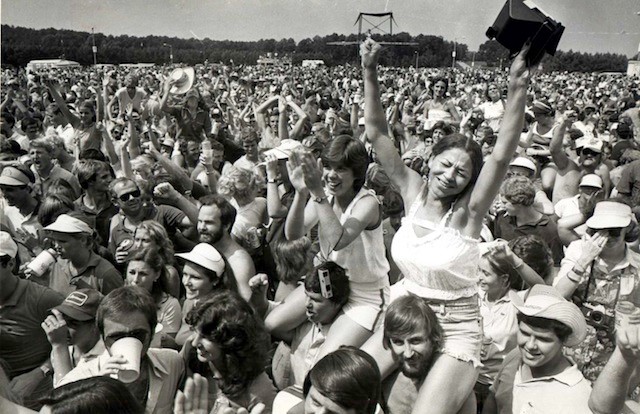
#22 There have been Many Attempts to Recreate Woodstock
Their failure wasn’t in organization, publicity or choosing the right bands. It was in misinterpreting the message of Woodstock. It was in believing it was only about sex, drugs and rock and roll. It was the peaceful revolution. It was acceptance without boundaries. It was a celebration of nature.
The crowd broke early on the last day of the concert, discouraged with the rain that had rolled down the hills, saturated their campsites and rolled in streams through the foot paths. Thousands of feet churned through the mud, growing thicker, deeper, spreading wider with each rainfall. When the skies cleared, and Jimmy Hendricks came out to play, only thirty thousand loyal fans were left to great him.

#23 Jimmy was Dynamite
He was intoxicating. His strings ran a high wire that soared above all others, crashing and thundering into the retreating clouds. For those who were left, he was the grand finale of a symphony orchestra that had been lifting us higher and higher for three days.
Jimmy was the fulfillment. All other musicians rolled into his guitar, waiting for their turn to sing. He released them, one by one, letting them soar, letting them rejoin their voices in the sky. Jimmy was never a goodbye. Jimmy was a promise that music was immortal. He was the flashpoint along a treacherous trail. He was the final blessing for a movement that changed an entire generation of youth.

#24 Some Remember only the Rain and Mud
Attempts to reenact Woodstock have included full nelson romps in the mud, as though it was the most joyous aspect of the occasion instead of a symbol of the weather that nearly dethroned the king.
Even the hardiest, gypsy-styled hippie, who lived life from a bus, wasn’t especially thrilled with the rainy weather. Women hiked up their skirts, men rolled up their jeans, boardwalks were placed over the worst mud puddles. Every attempt was made to keep the rain from entering their shelters.
It was a test of faith. Our paradise didn’t always include perfect weather. It didn’t eliminate hardships. It challenged us to be more than fair weather friends. We were being forged. Whatever our reasons for attending Woodstock, something about it would change us. We would pick up new moral definitions, re-organize our priorities, ponder over ideological questions. We would grow.

#25 We Didn’t Rage Against the Machine… We Pushed
The 1999 attempt to bring Woodstock back to life ended in violence and destruction. There were at least four incidents of gang rape. Nearly 400,000 people attended. If the original Woodstock was plagued with rain, Woodstock ’99 was a muttering wave of heat under conditions that were too crowded, with too little water and inadequate sanitation.
The crowd was encouraged to be angry. They were encouraged to let out their frustrations and “break stuff”. Bon fires were built, and stage sets destroyed to feed them.
It was a far different era. The young people who had declared, “trust no one over thirty” were now pushing fifty and a whole new generation had taken over.
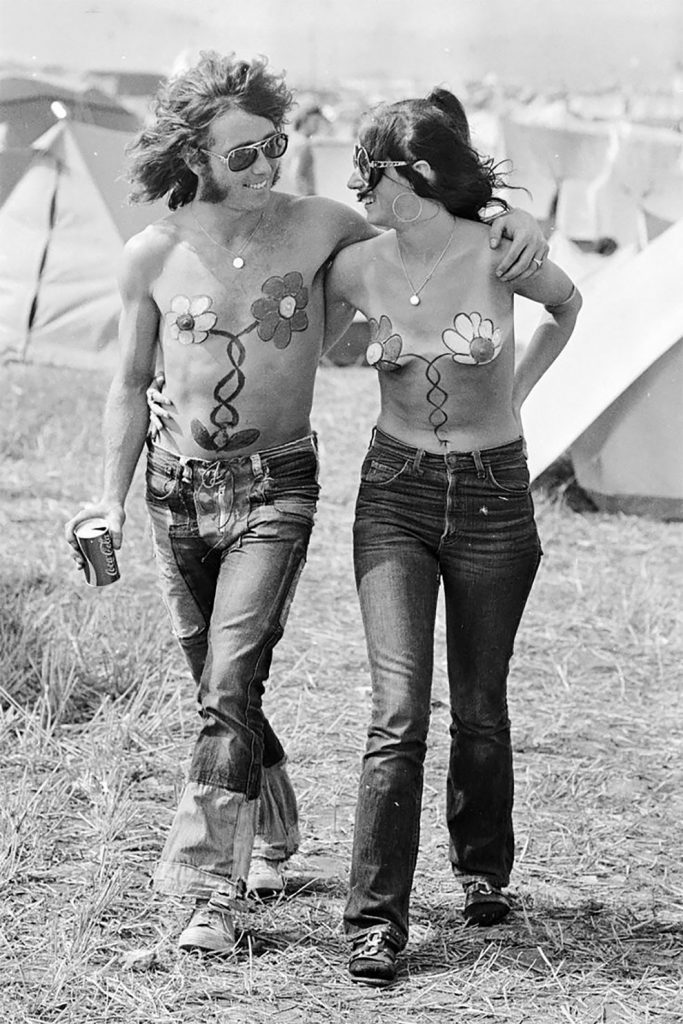
#26 We Walked Together
The pre-feminist woman had liberated herself. She had taken over her own body and had chosen what she would do with it. She had spelled out her own boundaries. She had joined a supportive network that respected her personal decisions. She found partners who walked neither ahead nor behind her, but right beside her.
Nineteen sixty-nine was the summer of love, the summer of festivity. It bathed in a seething background that had already included the death of a president, Vietnam War protests, Civil Rights riots, and domestic abuse issues. It was the ultimate illustration of what could be done to bring harmony to a troubled nation.
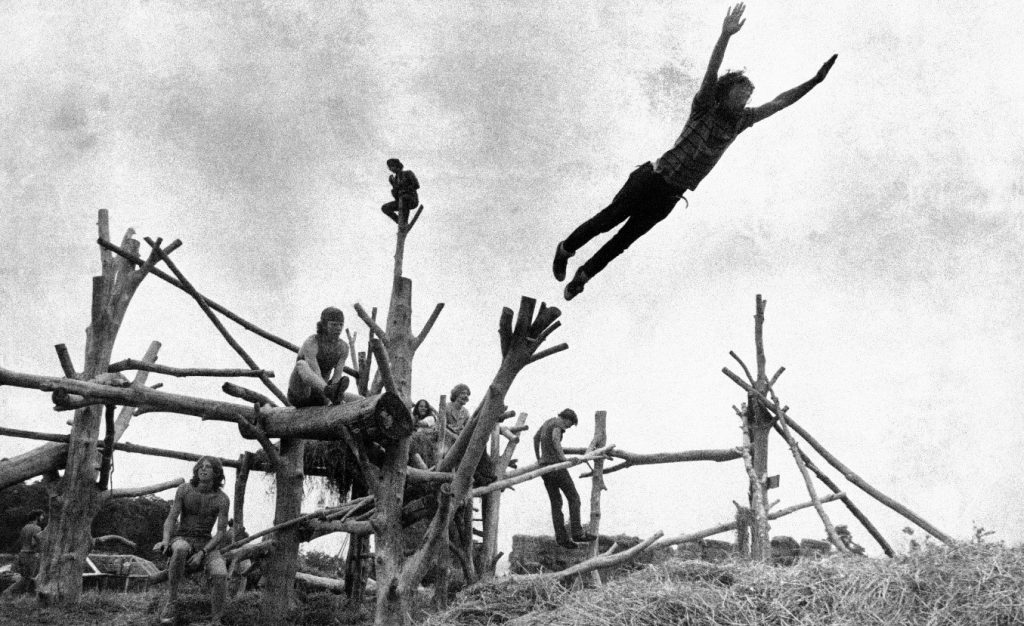
#27 We were on a Precipice
We could climb no higher. We waited on that ledge, transforming, stretching higher, trying to pull heaven down to earth or ourselves into heaven. We pulled as much energy out of the air as we could to prepare us for the future, to fortify us for the times when there would be no peace.
We may have pulled some angels down to walk among us. There have been whispers that this is why Jimmy and Janis left us. They wanted to walk among the angels even though we still needed them on earth.
Woodstock clung to us. It changed us. We hungered more for the paradise we had seen a short glimpse of, drew closer together.
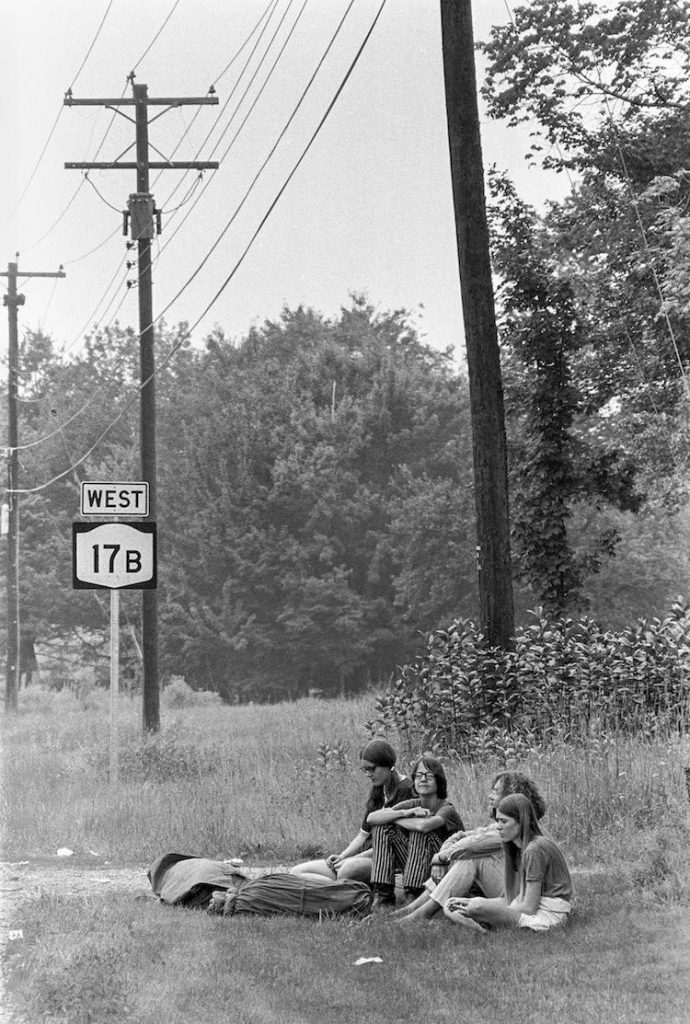
#28 We Traveled More
Woodstock put everybody in motion. The vibration was so great, even those who had not gone were instantly charged by those who had participated. It was a contact high. We all wanted to take to the highway. We all wanted to discover once again the magic that occurred at Woodstock.
Communes were created, communities built, driven by the post-Woodstock back to earth movement. Co-ops sprang up, industrious hand-craft trade flourished, and colleges retained an open-door policy, allowing anyone who wanted to sit in on classes.

#29 It Begins with a Gentle Voice
Because of the degree of violence against women that accompanied the 1999 festival, women’s rights activists are concerned that women will not be adequately protected during this year’s celebration. They want to see more police patrol the crowds to avoid rape and assault.
From a flower child’s perspective, one has to wonder – how did it happen? Over half-a-million people crowded into the original festival in a celebration of life and love. That’s the size of a small city. There were only two deaths. One was insulin related, one occurred when a young man got run over by a tractor while sleeping in the field. There were also two births. But we were still as we listened to one voice singing clearly, then another and another, until the air filled with beauty and our hearts swelled.

#30 It begins with a Moment of Happiness
Pre-feminist women were critically aware of woman’s rights issues, but their festival was a celebration of equality. There were no police, no guards, minimal security, yet women expressed themselves freely, without criticism, without harassment, without unwanted advances.
Maybe it was a difference in the way we communicated. We were gentler with each other, kinder, more soft-spoken. We laughed spontaneously. We let happiness overtake us at any given moment.
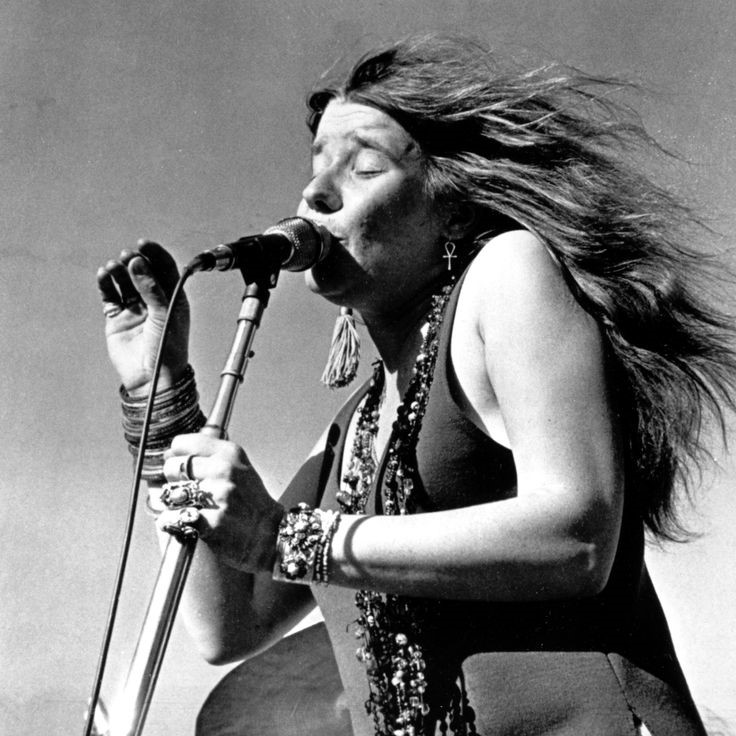
#31 Woodstock Can’t be Recreated
It can’t be reenacted. But there could be a Woodstock festival for the new generation. You have the power. It begins deep inside. It’s a response to a vision of paradise, a world of peace. You make the music. The musicians give it a language, a voice, a note to make you reach higher.
The flower children still drift. They have reached the ends of the world by now and have started home, their magic faded. They never stopped believing and neither should you. We reached higher; as high as you could reach; and it’s time for another golden experience. It’s time for a new generation to touch the sky.

A wonderful, honest evocation of the space between worlds that was fleetingly at hand, then gone.